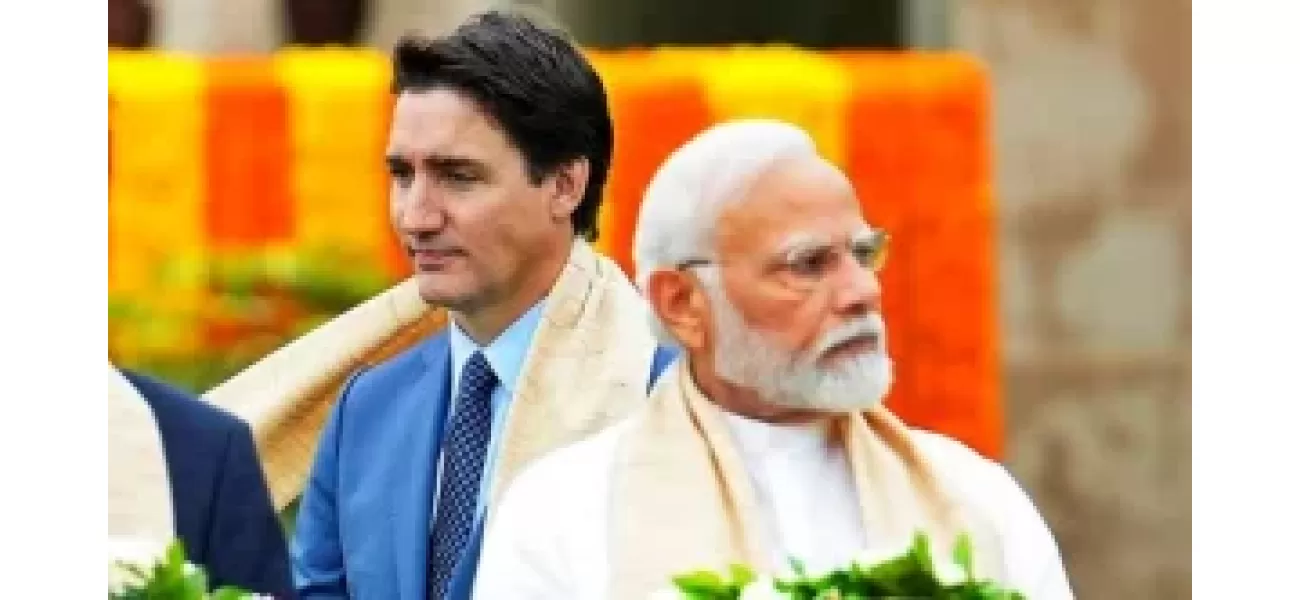A book about the rocky relationship between two siblings as they struggle to reconcile their differences and find common ground.
"India and Canada's strained relationship worsened on October 14 when they expelled their top diplomats over accusations linking the Indian High Commissioner to a controversial investigation."
October 15th 2024.

The relationship between India and Canada has been under a lot of strain, and it recently reached a boiling point on 14 October. Both countries took the extreme step of expelling their top diplomats, stemming from Canada's attempt to connect the Indian High Commissioner to an investigation into the assassination of Sikh extremist Hardeep Singh Nijjar.
New Delhi quickly rejected the accusation, calling it "outrageous" and part of Canadian Prime Minister Justin Trudeau's political agenda to win over certain communities. On the same day, Canadian officials held a press conference claiming that the Indian government and its agents were running a criminal network in Canada, targeting and harassing Sikh separatists. They went on to accuse a gang led by notorious criminal Lawrence Bishnoi of being involved in illegal activities at the behest of the Indian government.
Bishnoi, who has been in the news for the recent murder of a former minister in India, is said to have a long-standing grudge against popular actor Salman Khan for killing a blackbuck, an animal considered sacred by Bishnoi community, two decades ago. As tensions were already high, Trudeau publicly stated that India had made a "fundamental error" by supporting criminal activities in Canada and that his government had to take action based on the evidence presented by Canadian law enforcement.
To make matters worse, Canadian Foreign Minister Melanie Joly hinted at the possibility of imposing sanctions on India. She stated that expelling diplomats was the most severe measure a country could take under the Vienna Convention, but Canada would continue to push for cooperation and engage with its allies in the Five Eyes and G7.
The escalating situation could also have a negative impact on trade relations between India and Canada. India imports various products from Canada, and Canadian companies have invested billions in India's IT and financial sectors. The relationship between the two countries has been deteriorating since September 2023 when Trudeau claimed in parliament that Canada had evidence linking Indian agents to Nijjar's assassination. India has repeatedly denied these claims, stating that Canada has not provided any evidence to back them up.
In October 2023, Canada withdrew more than 40 diplomats from India, and a Canadian parliamentary committee identified India and China as the biggest threats to their country's democratic institutions in June 2024. This rift is only widening as other countries, including the US and the EU, are trying to strengthen their ties with India as a counterbalance to China.
It is essential to understand that Canada's accusations against India may not have escalated to this level without the US's support. As part of the Five Eyes intelligence alliance, the US is seen as a big brother to Canada. The US has also accused Indian agents of attempting to assassinate Gurpatwant Singh Pannun, a leader of the Khalistan movement who holds dual citizenship in the US and Canada. In November last year, an Indian committee was formed to investigate these allegations, and they are currently on a visit to the US. Furthermore, in a separate incident, an Indian national was charged by US federal prosecutors for conspiring to kill Pannun in New York.
It is no secret that Trudeau's Liberal Party has been supporting pro-Khalistan elements for political gain, as Canada is home to a large Sikh community. However, this situation has also brought attention to India's foreign policy and its aggressive stance on various issues with neighboring countries. The Ministry of External Affairs' behavior has often caused more harm than good, as evident from the tension that exists on all of India's borders. It is crucial for India to handle these situations with more tact and diplomacy to avoid further conflicts.
New Delhi quickly rejected the accusation, calling it "outrageous" and part of Canadian Prime Minister Justin Trudeau's political agenda to win over certain communities. On the same day, Canadian officials held a press conference claiming that the Indian government and its agents were running a criminal network in Canada, targeting and harassing Sikh separatists. They went on to accuse a gang led by notorious criminal Lawrence Bishnoi of being involved in illegal activities at the behest of the Indian government.
Bishnoi, who has been in the news for the recent murder of a former minister in India, is said to have a long-standing grudge against popular actor Salman Khan for killing a blackbuck, an animal considered sacred by Bishnoi community, two decades ago. As tensions were already high, Trudeau publicly stated that India had made a "fundamental error" by supporting criminal activities in Canada and that his government had to take action based on the evidence presented by Canadian law enforcement.
To make matters worse, Canadian Foreign Minister Melanie Joly hinted at the possibility of imposing sanctions on India. She stated that expelling diplomats was the most severe measure a country could take under the Vienna Convention, but Canada would continue to push for cooperation and engage with its allies in the Five Eyes and G7.
The escalating situation could also have a negative impact on trade relations between India and Canada. India imports various products from Canada, and Canadian companies have invested billions in India's IT and financial sectors. The relationship between the two countries has been deteriorating since September 2023 when Trudeau claimed in parliament that Canada had evidence linking Indian agents to Nijjar's assassination. India has repeatedly denied these claims, stating that Canada has not provided any evidence to back them up.
In October 2023, Canada withdrew more than 40 diplomats from India, and a Canadian parliamentary committee identified India and China as the biggest threats to their country's democratic institutions in June 2024. This rift is only widening as other countries, including the US and the EU, are trying to strengthen their ties with India as a counterbalance to China.
It is essential to understand that Canada's accusations against India may not have escalated to this level without the US's support. As part of the Five Eyes intelligence alliance, the US is seen as a big brother to Canada. The US has also accused Indian agents of attempting to assassinate Gurpatwant Singh Pannun, a leader of the Khalistan movement who holds dual citizenship in the US and Canada. In November last year, an Indian committee was formed to investigate these allegations, and they are currently on a visit to the US. Furthermore, in a separate incident, an Indian national was charged by US federal prosecutors for conspiring to kill Pannun in New York.
It is no secret that Trudeau's Liberal Party has been supporting pro-Khalistan elements for political gain, as Canada is home to a large Sikh community. However, this situation has also brought attention to India's foreign policy and its aggressive stance on various issues with neighboring countries. The Ministry of External Affairs' behavior has often caused more harm than good, as evident from the tension that exists on all of India's borders. It is crucial for India to handle these situations with more tact and diplomacy to avoid further conflicts.
[This article has been trending online recently and has been generated with AI. Your feed is customized.]
[Generative AI is experimental.]
0
0
Submit Comment





